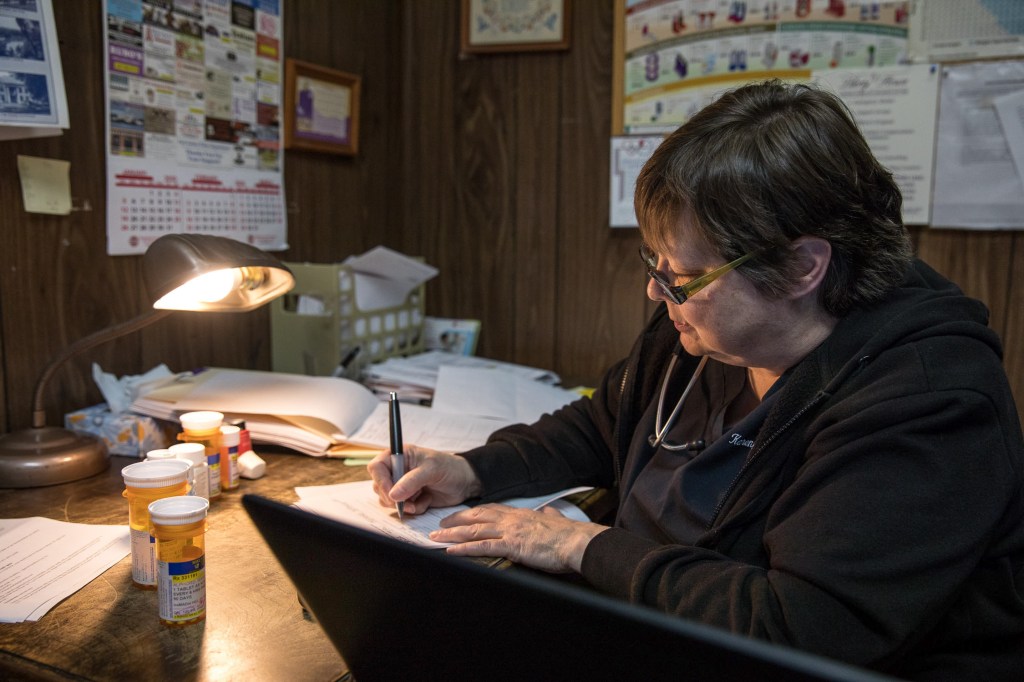Rural doctors worry about lifting social distancing
Published 5:15 pm Wednesday, April 29, 2020

- Dr. Karen Kinsell, 64, writes down prescriptions and doses for patients in an exam room at the Clay County Medical Center on Jan. 8 in Fort Gaines.
ATLANTA — Dr. G. Ashley Register, a family practitioner in Cairo, Georgia said after the state’s health system lost its first nurse to COVID-19, the prospect of loosening social distancing restrictions hit closer to home.
“We had a health care worker die,” he said Wednesday. “And that makes it even more personal.”
Register was among a group of doctors speaking out on the current state of coronavirus in Georgia during a press conference hosted by Protect Our Care Georgia — an advocacy group that pushes for full Medicaid expansion.
Rural Southwest Georgia has seen a surge of coronavirus cases, with Doughtery County designated as one of the country’s worst hotspots. As cases continue to flood hospitals, the group said, there’s little indication coronavirus spread in Georgia is leveling off.
Register said in Grady County, he admitted two patients just yesterday and nervously awaits the impact of lifting the statewide shelter-in-place order, set to expire Thursday.
“We’re concerned and a bit frightened that the number of COVID cases will go up,” he said. “… It’s a cascade effect that will happen if we’re not continuing to pressure people to take it seriously.”
Epidemiologist Dr. Rebecca Mitchell, a visiting assistant professor at Emory University, said multiple Georgia-specific case models indicate increased infection rates if social restrictions are relaxed.
“The scientific modeling community is in agreement that without maintaining changes to social interactions that are in place,” she said, “we have insufficient ability right now to control the spread of this virus. It will spread in large cities, and it will spread in rural areas.”
Looking at county-by-county breakdowns of cases and death percentages based on population, Mitchell said, the worst ranking counties are in rural areas of the state.
“This is not an urban problem, this is an everywhere problem,” she said.
Although Gov. Brian Kemp has begun Georgia’s transition to reopening businesses, many questioned if the state had actually met the federal requirement of a 14-day decline in cases, despite Georgia Department of Public Health downward trending graphs.
Mitchell said the graphs updated twice daily, don’t tell the whole story. The lag in case reporting will always cause lower numbers on the current day and increasing numbers in previous days — which is clearly noted by the department in the data footnotes.
“When we look at these graphs, be aware that the cases over the past week or two will be revised upward each day,” she said. “And that the past seven days will always appear to trend downward due to structural reporting lags in the system.”
Dr. Karen Kinsell, the sole health care provider in Clay County, said she keeps post-it notes above her desk of names of patients who have exhibited coronavirus symptoms in the past few weeks — some of whom were tested, she said, more than half were probably not.
“All these numbers that the state is pointing out are an undercount,” she said during the press conference Wednesday. “We’re not anywhere close to the end of this.”
Georgia is one of a handful of remaining states that has chosen to forgo expanding Medicaid. The decision, Kinsell said, is having serious ramifications during the coronavirus outbreak.
“People around here are sickly both due to the poverty and chronic medical conditions,” she said. “But if they also can’t get health care, they will get sicker and die in normal times and certainly as we’re seeing in a pandemic.”
The thought of the statewide shelter-in-place order expiring is scary, both Register and Kinsell said.
“It makes me mad,” Kinsell said. “We treat science almost like a religion in some ways … how can we abandon it at this time when this is the worst pandemic this country has been through in 100 years?”
Mitchell said two new models — including one by a partnership of Georgia Tech, Harvard and Massachusetts General Hospital — show loosening social restrictions will cause an increase in cases.
The model shows lifting the stay-at-home order after four weeks could potentially lead to upward of 23,000 deaths in the state leading to a stricter “lockdown” order.
“The more relaxed we are and the more willing people are to go have face-to-face interactions with other people,” she said, “the stronger that new wave is going to be.
Editor’s note: This story has been updated to reflect a more accurate count of admitted cases in Cairo, Georgia.




